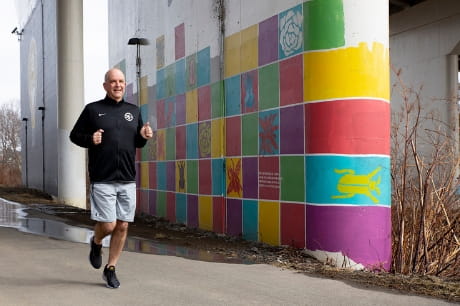Training for long-distance runs while fighting colon cancer
Don’t ignore your symptoms. Call your doctor and schedule a colonoscopy if you notice key changes in your digestive system.
“I was having symptoms… you know, changes in my digestive system,” recalls Wayne Thomas of Dickson City. So, the 52-year-old did what most people do when confronted with unusual medical symptoms—he looked them up online.
After his research, Wayne feared there might be something wrong, so he called his primary care doctor to schedule his first colonoscopy.
“Everyone told me to go out of town and I did. I talked to specialists in big cities,” says Wayne.
He also met with Joseph Bannon, MD a board-certified and fellowship-trained general and colorectal surgeon, right in Scranton at Geisinger Community Medical Center (GCMC). “Everyone came up with the same diagnosis and same way of treating it. So, I decided to go where I felt most comfortable.”
Wayne chose to stay close to home and receive his surgery at GCMC. “I felt comfortable with Dr. Bannon. He explained so much. He answered questions I didn’t know I needed answers to,” says Wayne.
Wayne had surgery on October 31, just four months after his colonoscopy. Dr. Bannon took time to explain everything to Wayne’s wife and daughter, answering all their questions as he recovered from surgery. “It’s what you’d expect from a doctor, but it’s not always what you get,” says Wayne. “Everyone was great to me and my family. The care I received was extraordinary.”
Wayne especially remembers nurse Karen Loftus. Karen is a registered nurse and colorectal surgery coordinator who helps her patients schedule their care and achieve their goals. “The staff at the hospital treated me like a VIP. The nurses were wonderful to my family. Karen was phenomenal,” remembers Wayne. “She made sure I got everything I needed. She really took care of me throughout the whole process.”
“My sister, Kathy McGrail, is my running partner and neighbor,” says Wayne. “Chemo and radiation affect everyone differently, but I think you can still accomplish goals if you push.”
Training with a group called Barrier Breakers, Wayne considers himself lucky. Surrounded by supportive friends and family, he was always honest about how he felt—good and bad. No matter what, his running group pushed him to continue working towards his goal.
“I won’t pretend I wasn’t tired, I was exhausted,” says Wayne, “but I did it.”
Today, Wayne is back on the trail and excited for his next race!
Knowing when it’s time to schedule a colonoscopy can save your life. We’re here whether you’re currently experiencing symptoms, are at the recommended age for your first colonoscopy—45 years old, or sooner—or need to schedule sooner if you’re at higher risk for colon cancer. Find a colonoscopy provider with Geisinger today.
After his research, Wayne feared there might be something wrong, so he called his primary care doctor to schedule his first colonoscopy.
Colonoscopy detects mass
Wayne saw gastroenterologist Dr. Duane Deivert for his colonoscopy in June 2018. Upon waking up after the minimally invasive procedure, Dr. Deivert told Wayne he had discovered a mass in his colon. This meant he had colon cancer. Wayne and his wife, Kellie, began to talk about the next phase and treatment.“Everyone told me to go out of town and I did. I talked to specialists in big cities,” says Wayne.
He also met with Joseph Bannon, MD a board-certified and fellowship-trained general and colorectal surgeon, right in Scranton at Geisinger Community Medical Center (GCMC). “Everyone came up with the same diagnosis and same way of treating it. So, I decided to go where I felt most comfortable.”
Wayne chose to stay close to home and receive his surgery at GCMC. “I felt comfortable with Dr. Bannon. He explained so much. He answered questions I didn’t know I needed answers to,” says Wayne.
Wayne had surgery on October 31, just four months after his colonoscopy. Dr. Bannon took time to explain everything to Wayne’s wife and daughter, answering all their questions as he recovered from surgery. “It’s what you’d expect from a doctor, but it’s not always what you get,” says Wayne. “Everyone was great to me and my family. The care I received was extraordinary.”
Wayne especially remembers nurse Karen Loftus. Karen is a registered nurse and colorectal surgery coordinator who helps her patients schedule their care and achieve their goals. “The staff at the hospital treated me like a VIP. The nurses were wonderful to my family. Karen was phenomenal,” remembers Wayne. “She made sure I got everything I needed. She really took care of me throughout the whole process.”
Training for long-distance runs on the road to recovery
Wayne is a runner and after learning he had colon cancer, he began training for long-distance runs with a local running group.“My sister, Kathy McGrail, is my running partner and neighbor,” says Wayne. “Chemo and radiation affect everyone differently, but I think you can still accomplish goals if you push.”
Training with a group called Barrier Breakers, Wayne considers himself lucky. Surrounded by supportive friends and family, he was always honest about how he felt—good and bad. No matter what, his running group pushed him to continue working towards his goal.
“I won’t pretend I wasn’t tired, I was exhausted,” says Wayne, “but I did it.”
Today, Wayne is back on the trail and excited for his next race!
Knowing when it’s time to schedule a colonoscopy can save your life. We’re here whether you’re currently experiencing symptoms, are at the recommended age for your first colonoscopy—45 years old, or sooner—or need to schedule sooner if you’re at higher risk for colon cancer. Find a colonoscopy provider with Geisinger today.

Content from General Links with modal content



